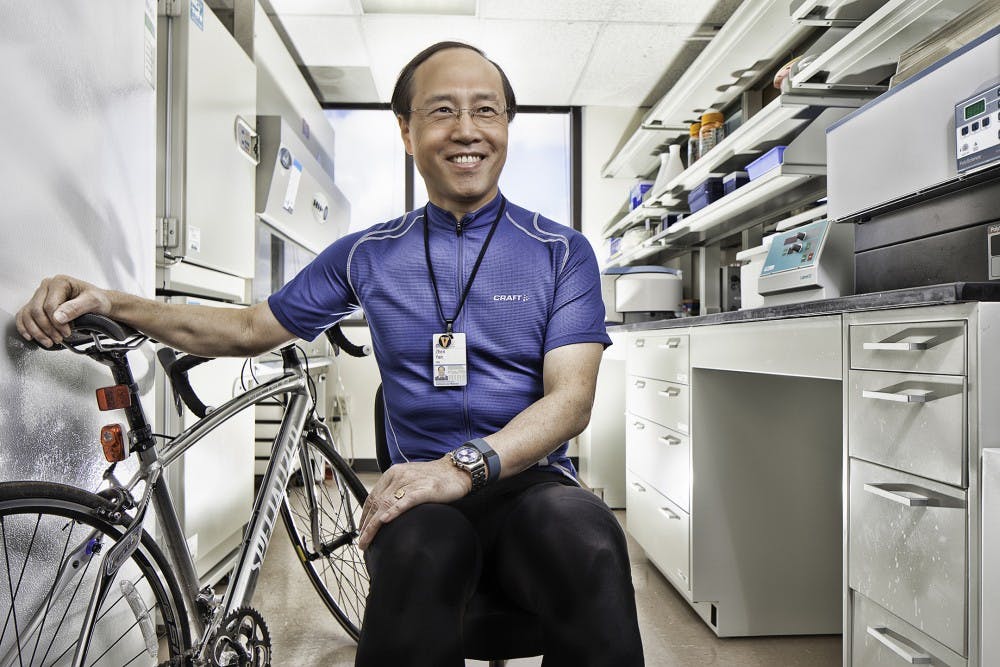The Centers for Disease Control and Prevention recommends that adults perform at least 150 minutes of moderate-intensity or 75 minutes of vigorous-intensity aerobic exercise per week to gain health benefits. A recent study by Cardiovascular Medicine Prof. Zhen Yan’s laboratory at the University has revealed the impact of exercise at the cellular level. According to Yan’s findings, published in “Nature,” exercise improves the health of mitochondria by triggering the removal of damaged mitochondria.
Yan’s lab is a part of the Center for Skeletal Muscle Research at the Robert M. Berne Cardiovascular Research Center, and it focuses on the molecular mechanisms of exercise and the impact of exercise on health. Several ongoing projects in the lab include studying the impact of exercise on mitochondria and skeletal muscles, the benefit of exercise in protecting against diseases and the effect of maternal exercise on the health of offspring.
Yan’s project that studied the importance of exercise on mitochondrial health received funding from the National Institutes of Health. Yan published his findings with Laurie Goodyear, associate professor of medicine at Harvard Medical School, Dr. Mondira Kundu from St. Jude’s Children’s Research Hospital’s Pathology department and University Assoc. Biomedical Engineering Prof. Jeff Saucerman.
In order to study mitochondrial health, Yan’s lab focused on mitophagy— the process of degrading damaged mitochondria. However, according to Yan, mitophagy occurs only in a small section of mitochondria, so finding a way to accurately measure this process was a challenge.
An important milestone in the progress of this study was the lab’s development of MitoTimer. MitoTimer is a reporter gene for a fluorescent protein that targets mitochondria and assesses mitophagy. The color the MitoTimer gives off shows whether mitochondria are healthy or damaged and undergoing mitophagy. Consequently, the development of MitoTimer provides a mechanism of assessing mitophagy in cells. Yan then used this technology in his study on exercise.
“We used a couple of physiological models of endurance exercise in mice combined with novel technologies of mitochondrial reporter gene … And molecular genetics to ask the question how endurance exercise helps removal of damaged/dysfunctional mitochondria,” Yan said in an email to The Cavalier Daily.
After using MitoTimer to study the cells of mice that were undergoing endurance exercise, Yan’s lab found that exercise induced stress in a portion of the mitochondria of the cells, which then initiated the process of mitophagy. As a result, undergoing mitophagy allowed the cell to remove damaged mitochondria and become healthier.
According to Yan, this study on exercise-induced mitophagy offered further insight into why and how exercise is so beneficial for health and preventing disease. However, Yan said she still has questions she would like to investigate.
“We need to figure out how activation of mitophagy and occurrence of mitochondrial stress/damage are coordinated,” Yan said. “In another word, we want to know how our cells figure out where the damaged mitochondria are and mobilize the mitophagy machinery to remove them.”
Shana Pack, wellness program director of Hoo’s Well, said being physically fit can improve all aspects of wellbeing. According to Pack, although people used to only consider exercise as benefiting physical health, wellbeing consists of a variety of aspects, including mental, emotional, physical and social health.
First-year College student Katherine Lake agrees that exercise benefits many components of health.
“Exercise is important both from a physical and mental standpoint,” Lake said. “While it keeps the body physically healthy, I think it also has positive impacts on the mind — releasing endorphins and making someone happier.”
Pack said that one reason that some people do not exercise frequently is because they get out of the habit of exercising. In order to make exercise a habit and an enjoyable activity, Pack said that people should connect their values to physical activity. For example, if someone greatly values family, Pack suggests that the person find ways to partake in physical activity as a family, such as by going on walks together.
“The other piece is starting small and being realistic not only in your goals — fitness goals — but being realistic with when and where it works,” Pack said.
Pack also said that research findings, such as Yan’s study, show the benefits of being physically fit will help to encourage more people to exercise.







